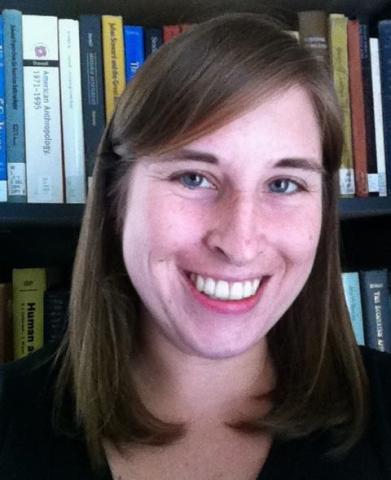Where Are They Now? - Adrianna Link

"Where Are They Now?" is a series of profiles on CHI Fellow alumni.
Eniola Ajao '21
June 22, 2020
Adrianna Link, Head of Scholarly Programs at the American Philosophical Society (APS) and former Fellow at the Center for Humanistic Inquiry (CHI), describes herself as an “intellectual matchmaker.” After receiving her Ph.D. from the Department of History of Science and Technology at The Johns Hopkins University in 2016, Link became a CHI Fellow from 2016-2017, a time during which she had the opportunity to engage in collaborative, interdisciplinary work with other Fellows. Now in her role as Head of Scholarly Programs at the APS, Link hopes to bring that same spirit of collaboration and describes it as one of her favorite parts about her job. She says, “I always love putting people together in a room who may not know that one another exists because of these weird disciplinary divisions, but actually having some hand in building conversations across fields is very gratifying.”
Founded in 1743 by Benjamin Franklin, the American Philosophical Society is “the oldest learned society in the United States.” Link clarifies, “Philosophy in this case refers to natural philosophy, so science basically.” Today the APS functions as a research library, complete with a museum, a publication series, and a members’ organization. Members include Freeman Dyson, American theoretical physicist and mathematician, Cormac McCarthy, novelist and author of “The Road” and a range of other actors, scientists, and public facing individuals. The APS also awards a number of grants and fellowships every year, a process that Link is very close to: “We have external grant fellowship recipients, but we also have a residential fellowship program.” The APS hosts about 30-40 fellows each year and Link’s role involves managing the fellows’ experiences, helping with the application and selection processes and developing programming for the fellows. Additionally, she helps to run conferences and other scholarly events: “We throw parties for nerds. It’s a good time,” Link jokes.
The more difficult aspects of her position require Link to wrestle with some tough questions. “There’s some challenges you anticipate with older institutions and some challenges that you don’t. It’s been interesting to navigate those and also to help the institution come into the 21st century a little bit.” She continues, “One of the challenges is figuring out as an older institution that was created in this kind of fraught moment in American history, when it really was white men that were calling the shots,’How does an institution that old figure out how to reach out to new kinds of audiences and constituencies’?” I think that it’s something we’re continuing to work on. We’re hardly perfect in that regard but we’re definitely learning how to be better because the institution has so much to offer to so many different communities.”
As a part of her job, Link gets to meet “a lot of really great scholars in my field.’ However, she particularly enjoys helping the fellows through their academic journey, and the excitement that it entails.“ I really love that kind of mentorship process and sharing the energy that people bring when they’re starting new projects, ” she says. Link’s own work examines the intersection of anthropology and the environmental sciences. As a historian of science, she is particularly interested in museums and archives as sites of preservation.“I work on Smithsonian Anthropology in the 1960’s and 70’s, so a lot of what I was doing there [at Amherst] was going through some notes and photographs that I took the summer before I arrived, cleaning up my work and doing some background reading and having conversations and working on putting those pieces together.” She’s currently working on a book project: “I’m in a moment now where I’m just starting to get the book project together that’s based on some of that work and the time at Amherst gave me a good foundation for what I think is going to be the final chapter of that book.” She expects the book to be completed in the next year and a half. She jokes, “You can’t be the head of a scholarly community without being part of it yourself.”
Reflecting on her time at the Center for Humanistic Inquiry, Link says she is grateful for the support she received from Martha Umphrey, former director of the CHI, and her other fellows, adding that she “never felt alone” during her time there. In fact, Link connects regularly with her former CHI Fellow peers. She’s thinking about starting a working group for a consortium in the history of science based in Philadelphia with one of the CHI fellows in her cohort. “We’re still regularly collaborating as a result of the connections we made while we were here.” While Link wishes she’d had more exposure to the undergraduate population during her time at the CHI, she leaves them with this piece of advice: “Go outside, life is short."